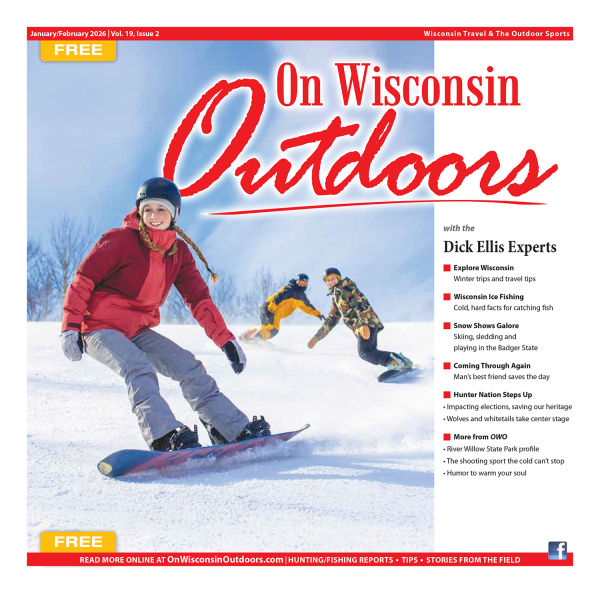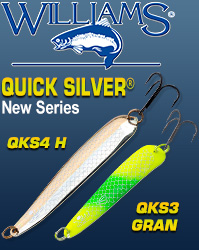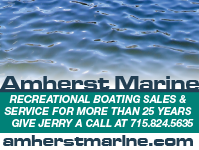Safe Boating Week: Life Jackets - Worth Your Life Every Week
May 17, 2013
By: Joanne M. Haas/Bureau of Law Enforcement
DNR Customer Service Staff to wear life jackets to work today: National Safe Boating Week starts tomorrow
 Safety is cool, hip -- and fashionable. And today the Friday look for DNR customer service staffers is business "safety" casual.
Safety is cool, hip -- and fashionable. And today the Friday look for DNR customer service staffers is business "safety" casual.
If you stop in at a DNR Customer Service Center today, you may be served by someone sporting a life jacket. That's because tomorrow starts National Safe Boating Week, May 18 - 24 -- a great week to start the habit of using life jackets.
It’s the preventable death that haunts survivors. That’s what National Safe Boating Week is all about – making the life-saving habit of putting on a life jacket every time you board a boat.
“Safe boating means making it a habit to put on your life jacket – and making sure everyone in your boat has one on, too – before you turn the key and pull your boat from the dock,” Conservation Warden/Boating Law Administrator Roy Zellmer says. “The belief you will be able to get the jacket on as you fall over the boat’s side for whatever reason is unrealistic.”
National Safe Boating Week, May 18 – 24, is the last full week before the much celebrated Memorial Day weekend. This weekend typically kicks off the summer recreational and boating. Wisconsin is well known to the boating community, thanks to its 15,000 lakes and 84,000 river miles enjoyed by nearly one million state boaters and thousands of visiting tourists. Wisconsin ranks in the top 5 nationally for registered boats.
Zellmer said of the 23 boating fatalities in Wisconsin last year, 18 were drowning and only 2 of the victims were wearing life jackets. From 2007-2011 there were 67 people who drowned in boating incidents in Wisconsin and 91 percent of them were not wearing lifejackets.
“This mirrors the national statistics from the U.S. Coast Guard, which show over the past few years that 90 percent of all boaters who drown were not wearing a life jacket,” Zellmer said. “Wearing a life jacket is one of the simplest ways to save lives while boating. Having a life jacket with you, but not wearing it is like not wearing your seatbelt in a car – by the time you realize you need it, it’s too late to put it on.”
Life jacket regulations – canoes and kayaks included
The U.S. Coast Guard and Wisconsin laws require vessels under 16 feet in length to be equipped with one Type I, Type II, Type III or Type V personal flotation device, more popularly known as a life jacket, for each person on board.
“This also covers canoeists and kayakers,” Zellmer says. “Each must carry a wearable life jacket or personal flotation device (PFD) for each person on board.”
Vessels 16 foot or more in length must be similarly equipped and there also must also be at least one Type IV -- or throw-able -- PFD for the boat.
In order to be an acceptable, Zellmer says, each PFD must meet these recommendations listed below.
- Be approved by the U.S. Coast Guard.
- Be in good condition with no tears, rips, broken straps or snaps. Use a squeeze test on kapok PFDs to check for punctures in the inner plastic liner.
- Be the right size for the intended wearer.
- Be readily accessible, which means it may not be stowed in plastic bags, in locked or closed compartments or under other equipment.
PFDs come in a variety of shapes, colors and materials. Some are made to be more rugged and last longer while others are made to also protect the wearer from cold water.
“No matter which PFD you choose, make sure you get the one that's right for what you plan to do, what type of vessel you are going to use and the anticipated weather conditions,” Zellmer says. “Always look for the United States Coast Guard approval number on any PFD you buy.”
Stay sober, get safety smart – and get your life jacket
Zellmer says National Safe Boating Week also is a good time to review other important safety items for boaters. These include:
- Complete a Safe Boating Course. In 2012, the DNR Boating Safety Education Program sponsored 201 boating safety courses plus 25 online classes and certified 11,676 students. There are currently 611 active instructors certified to teach boating safety in Wisconsin.
- Equip and inspect your boat before hitting the water.
- Make sure you travel at the safe speed for your water conditions and surroundings – and that includes other vessels on the water around you.
- Help other boaters in distress.
- Stay sober and wait until safely back at home to have any alcoholic beverages.
“Mixing alcohol with a high-speed motor on a watery track is a recipe for disaster,” Zellmer said. "We would like to make 2013 the safest boating season ever. We can do it if everyone follows safe boating practices.”
To view the different types of U.S. Coast Guard-approved life jackets, visit:
http://dnr.wi.gov/topic/boat/pfd.html
Find more information about boat safety classes, go do the dnr.wi.gov and search “boat.”









